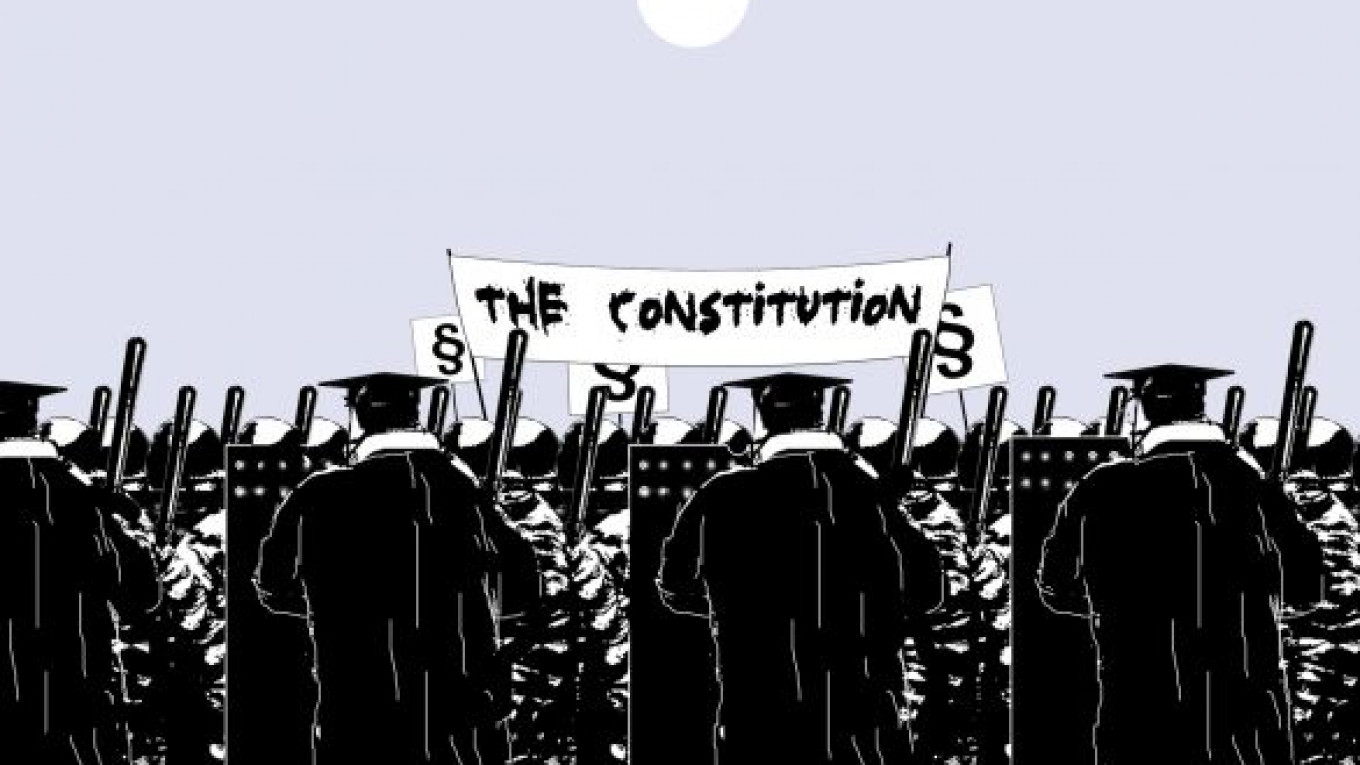Nationalism is an infantile disease. It is the measles of mankind."
This quote from Albert Einstein is a very convenient explanation for the surge of nationalist sentiment in Russia. Post-Soviet Russia, age 20, is a young country. The migration and demographic shifts that we are seeing today are unprecedented in Russia's history. For the first time, foreign languages are heard on the streets of the country's ancient towns, and Moscow has turned into a Babylon inhabited by many nationalities and every race on Earth.
This influx of migrants from other cultures naturally provokes mixed reactions from the local population. Russian society is polarized between two extremes — those who welcome migration and cultural diversity as beneficial and those who protest it with signs demanding "Russia for Russians" and want the migrants deported.
But Einstein's metaphor leaves out one factor — the state. The Russian government hasn't done a very good job of creating a melting pot. To the contrary, whenever it has gotten involved in interethnic conflicts and tension, its ham-fisted police methods have been far more destructive than conciliatory. This was the case in Chelyabinsk, where the police sent requests to schools asking for a list of students of "Caucasus nationality" along with their addresses and parents' names. They requested this information for both Russian citizens and noncitizens alike.
The director of Math School No. 31, Alexander Popov, responded by publishing the request on Internet. And his official reply to the police was bold: "In response to your request, in our school there is just one nationality — mathematician."
Popov's refusal to comply with the police request was most likely justified, since it might contradict current legislation, in particular the law "On personal information." But the response on the Russian blogosphere was explosive, garnering Popov both copious praise and aggressive insults. An anonymous blogger commented on Popov's blog on the Komsomolskaya Pravda site: "Popov, take your family and go to the Caucasus. You'll get vaccinated against tolerance! The local wogs will slit your family's throats while you stand by saying, 'Don't yell, dear, be tolerant.'"
Bloggers and posters who supported the police request generally cited the problem of ethnic crime. And it's true that criminal groups from the Caucasus have largely defeated Slavic crime syndicates. But even Sherlock Holmes couldn't find a connection between crime and a Chelyabinsk high school that is considered to be the third-best math school in Russia. According to the Begin Group, which studies educational institutions, in the last eight years 81 students from the Chelyabinsk school have won the Russian Math Olympiad. Popov says his graduates are now studying in universities all over the world — in the United States, Europe and Israel. "It's the job of us teachers to protect our children from adult stupidity," he said in an interview to Moskovskiye Novosti.
Popov is known in Chelyabinsk for his rather eccentric teaching methods, and this isn't his first run-in with the authorities. After a teacher in his school allowed police officers to interrogate a fifth-grader in class, Popov publicly threatened to challenge the teacher to a duel.
It is coincidental that Popov's latest controversy took place during the nonstop protest actions in Moscow. But the actions of the protesters, angry over electoral falsifications, and the actions of Popov, defending the law protecting citizens's rights against the state's infringement of their privacy, have the same root source. There is a new generation of Russian citizens. They no longer believe in the centuries-old maxim that the government is always right. They believe in the principles of the rule of law.
This is what motivates environmental activists who are defending a forest from illegal destruction, students fighting to preserve historical buildings and demonstrators reading the text of the Constitution regarding the right to assembly to OMON riot police threatening to beat them with truncheons. For these activists and protesters, the law isn't just a piece of paper. They are ready to defend what's actually written in the document. They aren't afraid to stand up to the state, be it police officers or the infamously venal court judges who pass sentences without considering any of the defense's arguments and facts.
Zakhar Prilepin, a writer who is critical of the current regime, wrote on his blog, "We'd be priceless if even 1 percent of the population of Russia was like Popov." One percent is probably not enough, but the trend is clear. The Russian people who for centuries silently bore every violation of their rights have become more active in defending their fundamental rights. And judges, officials and the leaders in the Kremlin ought to know that by now.
Victor Davidoff is a Moscow-based writer and journalist whose blog is
A Message from The Moscow Times:
Dear readers,
We are facing unprecedented challenges. Russia's Prosecutor General's Office has designated The Moscow Times as an "undesirable" organization, criminalizing our work and putting our staff at risk of prosecution. This follows our earlier unjust labeling as a "foreign agent."
These actions are direct attempts to silence independent journalism in Russia. The authorities claim our work "discredits the decisions of the Russian leadership." We see things differently: we strive to provide accurate, unbiased reporting on Russia.
We, the journalists of The Moscow Times, refuse to be silenced. But to continue our work, we need your help.
Your support, no matter how small, makes a world of difference. If you can, please support us monthly starting from just $2. It's quick to set up, and every contribution makes a significant impact.
By supporting The Moscow Times, you're defending open, independent journalism in the face of repression. Thank you for standing with us.
Remind me later.








